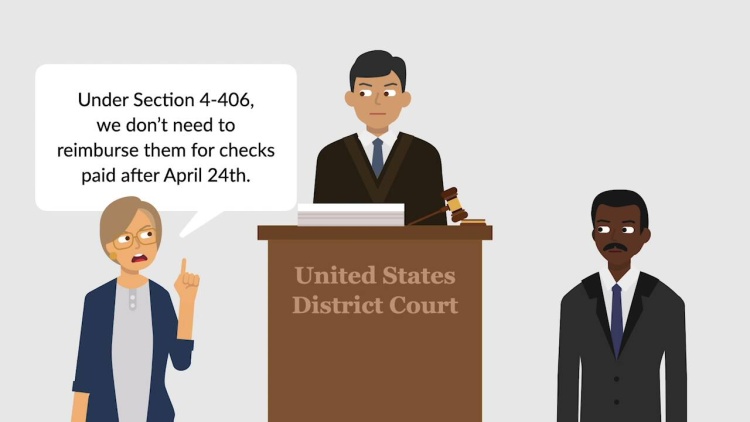Rhode Island Hosp. Trust Nat'l Bank v. Zapata Corp.
United States Court of Appeals for the First Circuit
848 F.2d 291 (1988)

- Written by Denise McGimsey, JD
Facts
Between March and July 1985, an employee of Zapata Corporation (defendant) forged a number of company checks—each between $150 and $800. Rhode Island Hospital Trust National Bank (Bank) (plaintiff) paid the checks. The payments were first reflected in the account statement received by Zapata on or about April 11. Zapata did not closely examine its statements, however. Thus, it did not notice the forgeries until July. By that point, the Bank had issued payments on the forged checks amounting to $109,247.16. The Bank brought an action against Zapata in federal district court to establish that the Bank did not need to reimburse Zapata for checks that the Bank paid after April 24, 1985, which was two weeks after Zapata's account statements began to reflect the forgeries. Zapata argued that Uniform Commercial Code (UCC) § 4-406 entitled it to reimbursement for the forgeries, even if it had itself been negligent in failing to discover and report them, because the Bank had not exercised “ordinary care.” The Bank offered evidence that, consistent with prevailing industry practice, it examined signatures on checks between $100 and $1,000 only if it had reason to be suspicious or if the check was randomly selected for examination, which applied to one percent of checks within that dollar range. The Bank also offered evidence that its decision not to examine all signatures on checks between $100 and $1,000 was cost-effective and did not lead to a substantial increase in forgeries. The district court determined that Zapata was not entitled to reimbursement. Zapata appealed.
Rule of Law
Issue
Holding and Reasoning (Breyer, J.)
What to do next…
Here's why 907,000 law students have relied on our case briefs:
- Written by law professors and practitioners, not other law students. 47,100 briefs, keyed to 996 casebooks. Top-notch customer support.
- The right amount of information, includes the facts, issues, rule of law, holding and reasoning, and any concurrences and dissents.
- Access in your classes, works on your mobile and tablet. Massive library of related video lessons and high quality multiple-choice questions.
- Easy to use, uniform format for every case brief. Written in plain English, not in legalese. Our briefs summarize and simplify; they don’t just repeat the court’s language.





